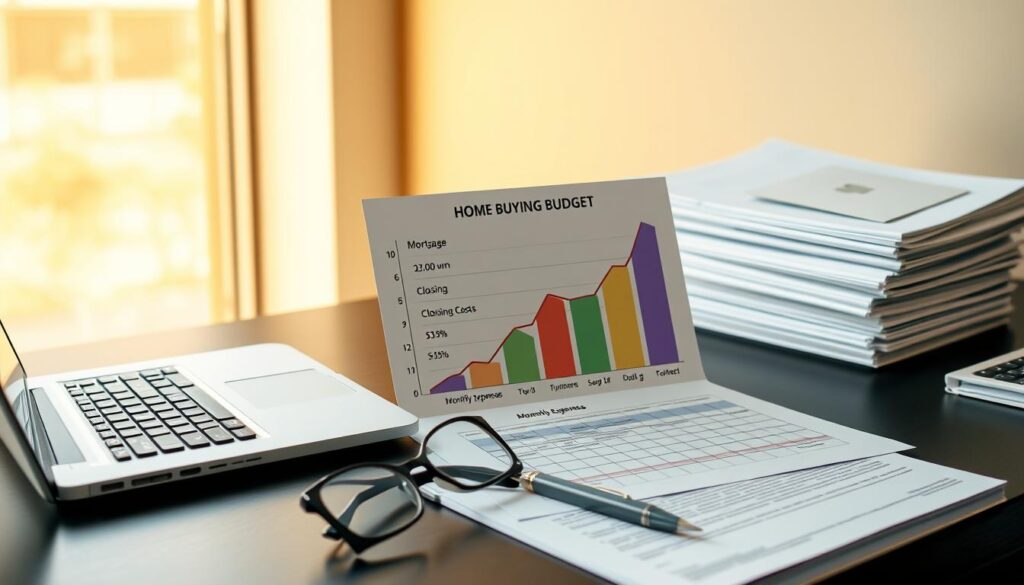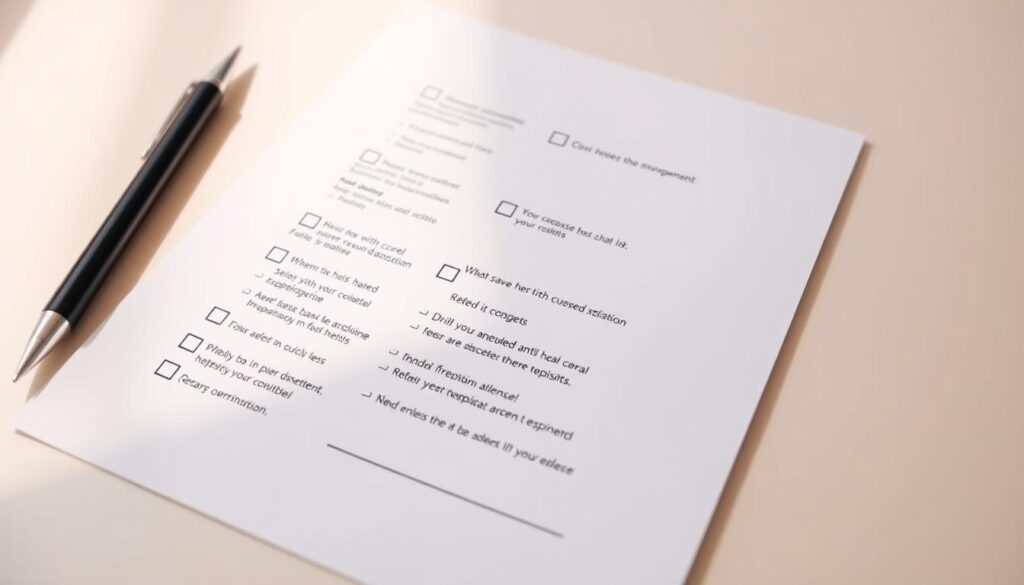Buying a house is a big financial decision. At Oak Real Estate, we get how complex and emotional it can be. Our expert tips aim to help you navigate this journey with confidence and clarity.
The national median home price hit $407,200 in October 2024. This shows the need for careful planning. When looking for a house, you must be well-prepared and have realistic expectations.
Understanding the real estate market is key. Our guide will cover important points. It will help you make a choice that fits your financial goals and lifestyle.
Key Takeaways
- Understand the financial implications of home ownership
- Prepare a detailed budget, not just for mortgage payments
- Research local real estate market trends
- Think about long-term financial stability
- Get advice from experienced real estate experts
- Plan for unexpected maintenance and repair costs
- Evaluate if you’re ready for homeownership
Financial Preparation Before House Hunting

Starting your journey to homeownership needs careful financial planning. First-time homebuyers are told to get their finances ready before looking for a home.
Credit Score Requirements
Your credit score is like a financial ID that lenders check closely. A good credit score can get you better mortgage rates. Aim for a credit score above 700 to get the best deals.
- Minimum credit score for conventional mortgages: 620
- FHA loan minimum credit score: 580
- Higher scores mean lower interest rates
Debt-to-Income Ratio Assessment
Lenders look at your debt-to-income (DTI) ratio when you’re buying a home. This shows if you can handle monthly payments.
“Your total debt payments should not exceed 36% of your pre-tax income” – Financial Experts
| Household Income | Total Monthly Debt Payments (36%) | Recommended Mortgage Payment (28%) |
|---|---|---|
| $75,000 | $2,250 | $1,750 |
| $100,000 | $3,000 | $2,333 |
| $150,000 | $4,500 | $3,500 |
Emergency Fund Importance
Having a solid emergency fund is key in homeownership. Experts say to save 3-6 months of living costs. This helps with unexpected home repairs or personal money issues.
- Save for unexpected repairs
- Cover possible income drops
- Keep your finances stable
By focusing on these financial areas, you’ll set a strong base for homeownership. This will also help you get approved for a mortgage.
Understanding Your Home Buying Budget

Figuring out your home buying budget is key. Mortgage lenders check your finances before they say yes. It’s about knowing how much house you can afford, based on your income, bills, and goals.
Experts say to follow the 28/36 rule. This means:
- Housing costs should be no more than 28% of your monthly income
- Total debt payments should be under 36% of your monthly earnings
- Keep your mortgage payments low for financial stability
Let’s look at an example. If you make $5,500 a month, you can spend about $1,540 on housing. This helps avoid financial strain and ensures you can handle your mortgage.
When setting your budget, remember these important points:
- Income stability – Check your job security and future earnings
- Future financial goals – Balance buying a home with other financial plans
- Additional housing costs – Include property taxes, insurance, and upkeep
Credit scores matter a lot for your mortgage rate. A better credit score can mean lower interest rates, saving you money over time. Aim for a score above 700 for the best deals.
Remember: Your home buying budget is not just about the mortgage payment, but your entire financial ecosystem.
Down Payment and Savings Strategy

Buying a home needs smart planning and saving. For first-timers, knowing about down payments is key to owning a home.
Traditional Down Payment Options
A 20% down payment is the best way to avoid PMI. With a median home price of $412,000, that’s $82,400. It’s tough, but it saves money in the long run.
- Conventional loans: 3% – 20% down payment
- FHA loans: 3.5% minimum down payment
- VA loans: 0% down payment for eligible veterans
- USDA loans: 0% down payment in rural areas
Additional Costs to Consider
Don’t forget about more than just the down payment. Closing costs are 2% to 6% of the loan, adding $8,240 to $24,720 for a $412,000 home.
Saving Methods for Home Purchase
Here are ways to save for your down payment:
- Automate monthly savings
- Cut unnecessary expenses
- Explore down payment assistance programs
- Consider high-yield savings accounts paying up to 4.75% APY
Pro tip: Keep your down payment savings separate to avoid mixing with other money.
Most first-time buyers put down 6% to 7%. With careful planning and exploring options, you can make your dream of homeownership come true.
What to Look for When Buying a House
Buying a house is more than just looking at how it looks. It’s about checking many important things. You need to look at the house’s condition carefully.
Before you buy, make a list of things to check:
- How strong the house is
- How much it might cost to fix things
- How good the neighborhood is and if it will go up in value
- If the house will work well for you in the long run
It’s also important to check the house’s systems:
| System | Average Replacement Cost | Typical Lifespan |
|---|---|---|
| Roof | $9,000 | 20 years |
| HVAC | $7,000 | 10-25 years |
| Water Heater | $900-$1,800 | 10-15 years |
Focus on essential features that fit your life and budget. Make sure to check the foundation, as fixing it can cost about $5,000.
Watch out for warning signs like:
- Water damage
- Mold
- Things that need fixing but aren’t
- Expensive systems that might need to be replaced
Getting a full home inspection, which costs $300-$500, can help find big problems. It can save you a lot of money on repairs.
Essential Property Assessment Checklist
Understanding the real estate inspection process is key for homebuyers. A thorough property check can avoid costly surprises and safety risks. Professional inspections usually last 2 to 3 hours and offer deep insights into a home’s state.

When evaluating properties, it’s wise to think strategically. Home inspections cost between $300 and $500. Yet, they can save you from big future expenses.
Critical Structural Components to Examine
- Foundation integrity and any damage
- Roof condition and repair needs
- Wall stability
- Signs of water damage or settling
Essential Mechanical Systems Assessment
Real estate inspections must check key mechanical systems. These systems affect a home’s function and safety.
| System | Key Inspection Points | Potential Risk Factors |
|---|---|---|
| HVAC | Age, efficiency, maintenance history | Replacement costs, energy inefficiency |
| Electrical | Wiring condition, panel capacity | Fire hazards, outdated infrastructure |
| Plumbing | Pipe material, water pressure | Potential leaks, corrosion risks |
Interior and Exterior Feature Evaluation
A property evaluation should also cover interior and exterior details.
- Window and door functionality
- Flooring condition
- Exterior siding and paint
- Landscaping and drainage
Pro tip: Always ask for a detailed inspection report. It’s a strong tool for negotiating in your home-buying journey.
Location and Neighborhood Evaluation

Finding the right location is key in real estate. Your neighborhood affects your daily life and your home’s value. Home buyers know that location is everything.
When checking out a neighborhood, look at these important points:
- Safety and crime rates
- School district quality
- Proximity to essential amenities
- Future development plans
- Property value trends
Crime rates are a big deal in neighborhood checks. Use CityProtect and local police sites for info. Don’t just look at current stats; check the past too.
Schools are vital for families. Check:
- State test scores
- Graduation rates
- Advanced placement courses
- Extracurricular programs
A good house hunting guide says to look at neighborhood basics. Make sure there are good sidewalks, street lights, and parks. These things make a neighborhood better and can raise your home’s value.
Understanding local market trends is part of due diligence. Look at home sale times, prices, and future plans. Neighborhoods with strong communities and growth are safer investments.
Understanding the Mortgage Process
For first-time homebuyers, the mortgage world can seem daunting. Getting your dream home involves several key steps. Home buying tips say it’s vital to be well-prepared and knowledgeable.
The mortgage process has six main stages. Each stage requires focus and smart decisions. First-time homebuyer advice stresses the need to grasp these details before getting a home loan.
Types of Mortgages
There are various mortgage options for different financial needs:
- Conventional Loans: Best for those with good credit scores
- FHA Loans: Great for first-time buyers with lower credit
- VA Loans: Only for military service members and veterans
Interest Rate Considerations
Interest rates greatly affect your financial future. It’s important to weigh fixed and adjustable-rate options carefully.
| Loan Type | Interest Rate Stability | Typical Duration |
|---|---|---|
| Fixed-Rate Mortgage | Consistent rate throughout loan | 15-30 years |
| Adjustable-Rate Mortgage | Rates can change periodically | 5-10 years |
Loan Term Options
Choosing the right loan term is key for managing payments and financial goals. The most common terms are 15-year and 30-year mortgages, each with benefits.
- 15-year mortgages help build equity faster
- 30-year mortgages have lower monthly payments
Grasping these mortgage details helps first-time buyers make smart choices that fit their financial plans.
Working with Real Estate Professionals
 Real Estate Professionals Guiding Home Buyers” title=”Real Estate Professionals Guiding Home Buyers” width=”1024″ height=”585″ class=”aligncenter size-large wp-image-1922″ />
Real Estate Professionals Guiding Home Buyers” title=”Real Estate Professionals Guiding Home Buyers” width=”1024″ height=”585″ class=”aligncenter size-large wp-image-1922″ />
Buying a home is complex. Real estate professionals are key in guiding buyers. They help make informed decisions. About 87% of buyers work with an agent, making it vital to choose wisely.
Finding the right team is important. Look at these factors when picking your professionals:
- Verify professional credentials and NAR membership
- Check transaction history and local market expertise
- Request client references and testimonials
- Understand their communication style and availability
Working with experienced agents offers big benefits. REALTORS® can help in many ways:
- Access to off-market properties
- Expert negotiation skills
- Comprehensive market insights
- Paperwork and legal guidance
Professional help is worth it. Homes sold by REALTORS® get 13% more. 90% of buyers get help with prices. Top agents handle 10 to 15 homes a year, bringing a lot of experience.
A skilled real estate professional transforms complex home buying into a strategic, informed decision.
When buying a home, find a dedicated agent. They should know your needs and the local market. Their knowledge helps you face challenges, find opportunities, and find your dream home.
Home Inspection and Due Diligence
Real estate inspection is a key part of buying a home. It’s vital for protecting your investment and avoiding surprises.

It’s more than just a quick look around. Inspectors check the home’s structure, systems, and hidden problems.
Professional Inspection Process
A detailed inspection looks at several important areas:
- Structural assessment of foundation and framing
- Electrical system evaluation
- Plumbing infrastructure check
- Roof and exterior condition analysis
- HVAC system performance review
Common Red Flags During Inspection
Inspectors spot issues that could cost a lot or need big talks:
| Issue Category | Potential Cost Impact | Recommended Action |
|---|---|---|
| Structural Damage | $5,000 – $30,000 | Request repair or price reduction |
| Electrical Problems | $1,500 – $10,000 | Negotiate repair credits |
| Roof Issues | $3,000 – $15,000 | Consider full replacement or repair |
Negotiation Points
Inspection results help in talks. Buyers can ask for:
- Seller-funded repairs
- Purchase price reduction
- Closing cost credits
- Home warranty inclusion
Expert tip: You might need up to 13 specialized inspections, depending on what’s found, for a full check.
Due diligence is not an expense, but an investment in your future home’s quality and your financial security.
Legal Aspects of Home Buying
Buying a home involves a lot of legal steps. You need to pay close attention and get help from experts. This step is key to protect your investment and avoid risks.
There are several important parts to understand when buying a property:
- Comprehensive document verification
- Title search and insurance
- Contract review and negotiation
- Compliance with local regulations
It’s wise to work with a good real estate lawyer. They help make sure everything goes smoothly. 30% of first-time homebuyers face legal issues during this time, showing why expert help is vital.
Here are some key legal documents you’ll see:
- Sale Deed
- Title Deed
- Khata Certificate
- Encumbrance Certificate
- Approved Building Plans
Property lawyers are essential in preparing for homeownership. They check documents, do due diligence, and make sure everything is legal. 85% of homebuyers with real estate professionals feel more confident about legal matters.
Getting legal advice can save you a lot of money and stress in the long run.
Knowing about zoning laws, property assessments, and community rules is important. It helps you make smart choices during the buying process.
Making a Competitive Offer
In today’s fast real estate market, making a strong offer is key. Houses are selling quickly, with 30% going for more than the asking price. Knowing how to buy a house can help you get your dream home.
Offer Strategy Development
Creating a solid offer strategy is important. It involves several key steps in your house hunting guide:
- Do a comparative market analysis to know local prices
- Set a price that’s competitive but fair
- Have a good earnest money deposit (usually 1-5% of the price)
- Be ready to act fast in a competitive market
Contingency Considerations
Managing contingencies well can make your offer stand out. While skipping them might seem good, it’s risky. Here are some important points:
- Home inspection contingency
- Financing contingency
- Appraisal contingency
- Risks of losing protections
Negotiation Tactics
Good negotiation is all about balance. With homes priced at $419,300 on average, knowing the market is key. Think about adding an escalation clause to boost your offer. A personal, polite offer letter can also sway sellers.
A well-prepared offer is your key to standing out in a competitive real estate market.
Conclusion: Your Path to Homeownership
Getting ready to buy a home is a big step. It needs careful planning and a detailed checklist. Even with high prices and rates, you can find your way. Knowing about down payments, credit scores, and long-term plans is key.
Oak Real Estate suggests doing your homework and getting expert advice. Look into different loans and understand closing costs, which can be 2-7% of the price. Keeping your credit score high can also help you find a good deal. First-time buyers might find loans that only need 3% down.
Buying a home is both thrilling and complex. Use tools like affordability calculators and work with pros. Stay flexible with your finances. With patience, prep, and the right help, you can make your dream come true.
Are you ready to buy a home? Call Oak Real Estate at (435) 640-7297 for help that fits your needs. Our team is here to guide you through the market with confidence.
FAQ
What credit score do I need to qualify for a mortgage?
Lenders usually want a credit score of 620 or higher for regular mortgages. FHA loans might accept scores as low as 580. VA loans can be even more flexible. A better credit score often means better interest rates and loan terms.
How much should I save for a down payment?
Saving 20% is traditional to avoid PMI, but many first-time buyers use 3-10%. FHA loans start at 3.5%, and some programs offer even lower down payments.
What additional costs should I budget for when buying a house?
You’ll need money for closing costs (2-5% of the home’s price), home inspection, and moving. Don’t forget property taxes, insurance, HOA fees, and an emergency fund for repairs.
How do I determine how much house I can afford?
Use the 25% rule: keep housing costs under 25% of your take-home pay. Think about your total finances, debts, goals, and income changes.
What should I look for during a home inspection?
Check the foundation, roof, electrical and plumbing systems, HVAC, water damage, and structural integrity. Always hire a professional for a thorough inspection.
How important is the neighborhood when buying a house?
The neighborhood greatly affects your life and property value. Look at school districts, crime rates, amenities, development plans, market trends, and community character.
What types of mortgages are available?
You can choose from conventional, FHA, VA, and USDA loans. Each has different requirements, down payments, and benefits. Conventional loans need higher scores, but government-backed loans offer more flexibility.
How can I make a competitive offer on a house?
Research local sales, understand the market, get pre-approved, and be ready to act fast. Consider strategic contingencies. An experienced agent can help craft a strong offer.
What legal considerations should I be aware of when buying a home?
Know all contract details, review property disclosures, and ensure a clear title. Consider title insurance and any contingencies. A real estate attorney can offer extra protection.
How much should I save in an emergency fund for homeownership?
Aim for 3-6 months of housing expenses, including mortgage, taxes, insurance, and maintenance. This fund helps with unexpected repairs or income drops.

